Frontline Reports
How it Started, How it’s Growing: World Relief Sacramento’s Welcome Club
In 2018, World Relief Sacramento volunteers Becca and Luke Voight began connecting with refugee youth at a local park. What started as an informal gathering has now grown into a robust program called The Welcome Club.
The Welcome Club partners with four area elementary schools to serve upwards of 100 students. It offers space for immigrant kids to ‘just be kids’. For many of these youth, schoolwork is difficult, and their guardians cannot give the same homework support that their American classmates receive. They are often translators for their parents and caretakers for younger siblings. Even if it’s just for an hour a week, The Welcome Club is where they can have fun with friends and coaches.
Like most of our U.S. programs, The Welcome Club had to make some big adjustments in 2020, moving all of its in-person programming online. I recently spent the day with WR Sacramento’s Children and Youth Manager, Makayla Synak, and got a first-hand look at the magic that happens at The Welcome Club, even in its virtual form. Follow along to learn more and find out how you can create communities of welcome for immigrants in the United States.
9:00 a.m.
Coach Makayla checks her car to make sure she has everything. Her trunk is full of children’s books, binders with waivers and forms, disposable face masks, hand sanitizer and craft supplies. Coffee cup in hand, World Relief blue t-shirt on, she leaves for the World Relief Sacramento office, which has been closed to clients since March of 2020.
9:30 a.m.
Makayla meets Coach Becca in the classroom at the back of the office. Becca, also masked and sporting her World Relief t-shirt, is adding printouts of song lyrics to 60 lunch bags on the floor. Every other Friday, Makayla, Becca and a small group of staff and volunteers take 60+ goodie bags to 12 apartment complexes for children and youth to unpack at their virtual Welcome Club that week.
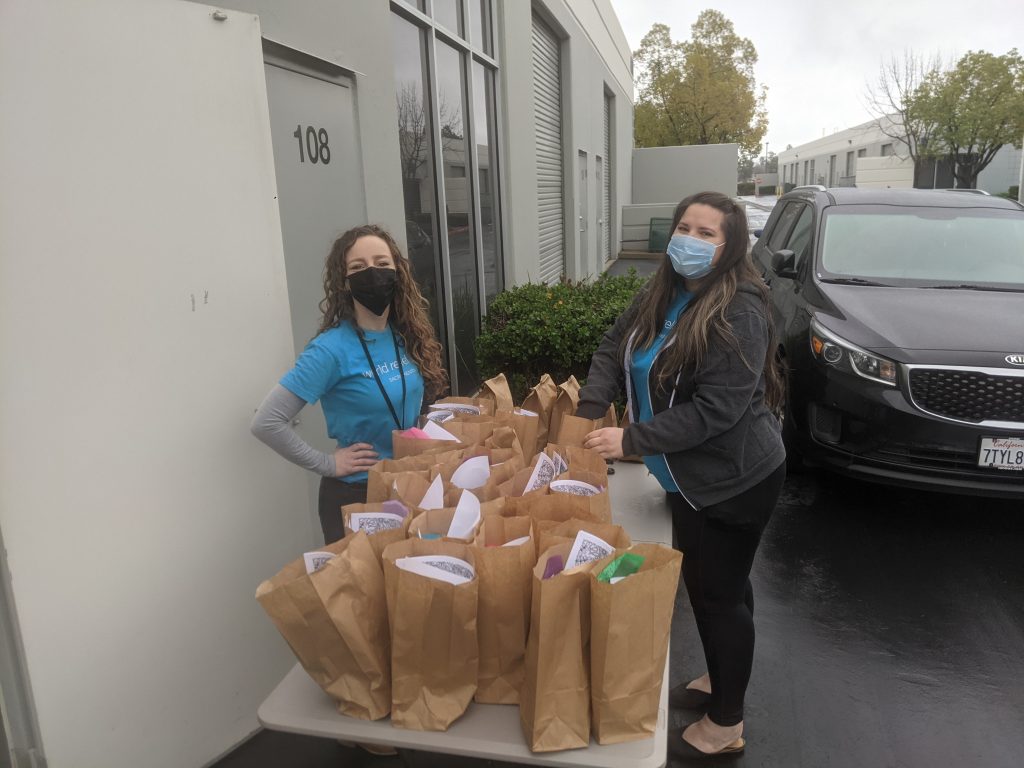
The bags are packed with goldfish crackers, contact paper and a booklet with the week’s Welcome Club theme: “Asking for Help and Giving Help.” Once filled, the bags are stapled shut with a note that says: DON’T OPEN UNTIL WELCOME CLUB. Becca and Makayla joke that most kids open their bags before club, but it’s worth a shot!
11:00 a.m.
Makayla takes a break from prepping goodie bags and logs into a Zoom meeting with a school vice-principal. This past summer, World Relief came together with local schools to talk about solutions for immigrant students who were falling behind due to COVID-19 and not logging onto Zoom for virtual learning.
Schools made a list of students who were struggling the most. Many of these students arrived in the U.S. just before the shutdown, and have never set foot in an American classroom. Since September, Makayla has logged 100 visits to over 50 of these families, checking in, walking through their assignments and giving them a laptop if they didn’t already have one.
12:00 p.m.
Makayla logs off Zoom and heads back to her car. She drives to the Las Palmas apartment complex, where many Afghan refugees live, to personally deliver 20 goodie bags. She barely sets foot in the courtyard when dozens of children and families approach and greet her excitedly. Ehsan, a seventh-grader who likes to help make deliveries, is among them.
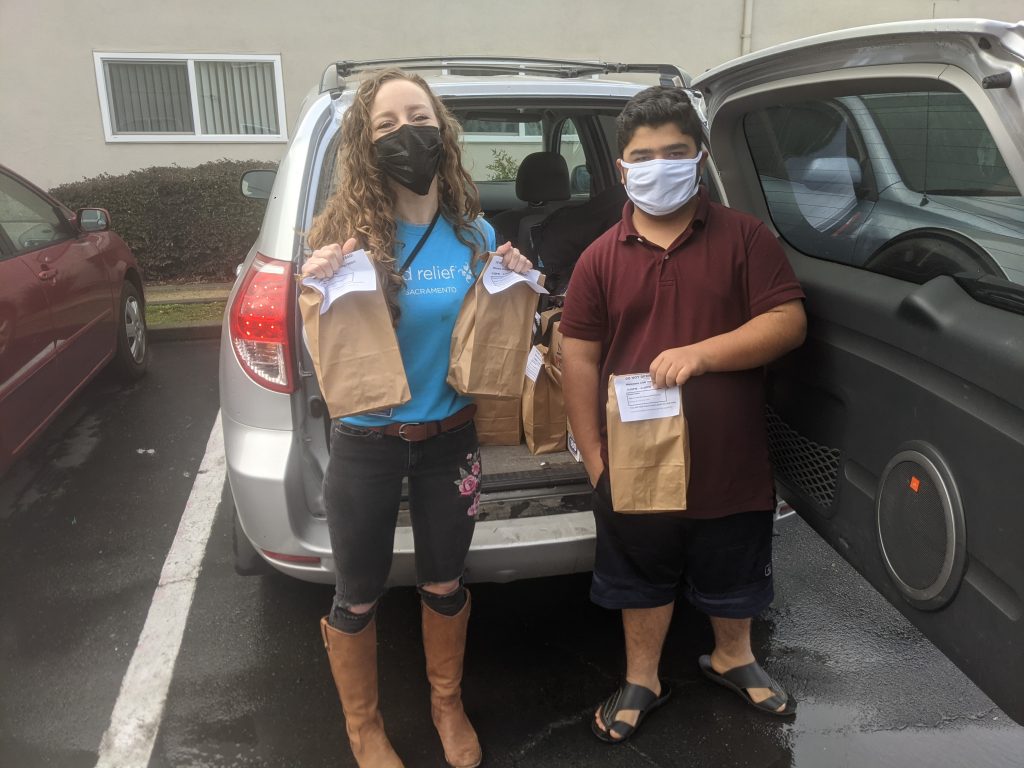
“I try to wait until he’s out of class,” Makayla says.
A group of children follow them from apartment to apartment. Mothers invite her in for tea. Her phone rings, and Makayla answers to help a student who is having an issue with her laptop. She stops to admire a girl’s braid, asks a boy about his school assignments, and greets everyone in Dari (the national Afghan language), which she’s trying to learn in her spare time.
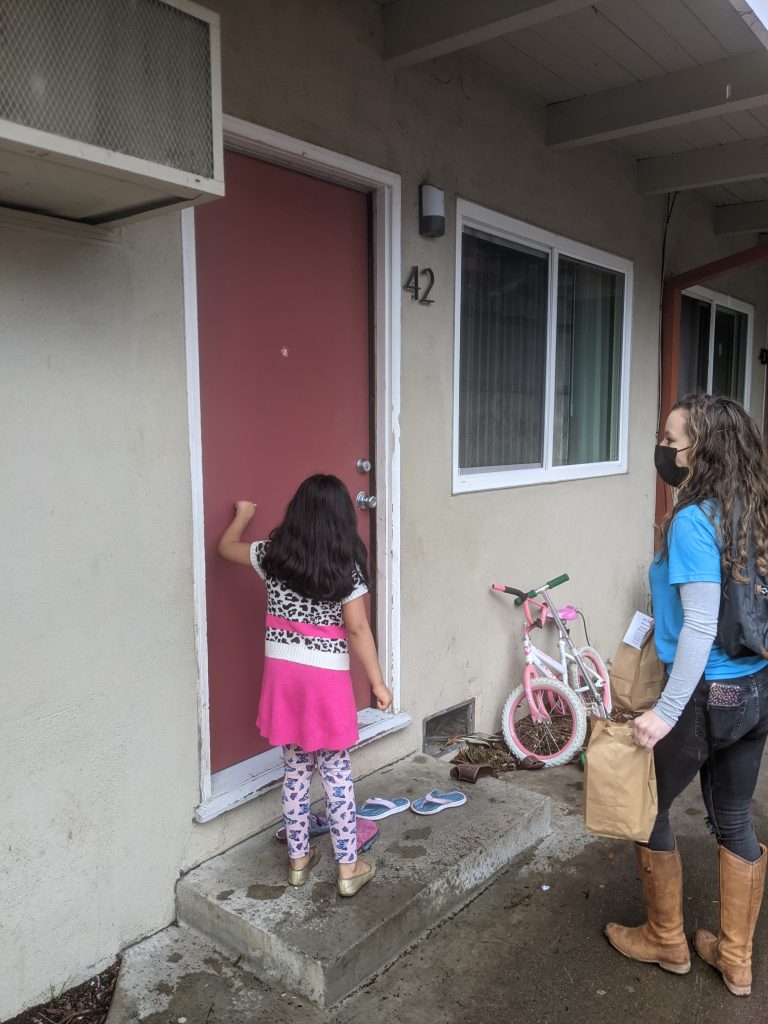
3:00 p.m.
Back at the office, Makayla and Becca log on to Welcome Club to meet with other staff and volunteers. Becca goes over the curriculum, assigning roles to each Coach. At 3:30, Makalya lets the students in from the waiting room, and soon two screens filled with 40 eager faces.
“Hi Coach Makayla! Hi Coach Becca!” The chat fills with messages of welcome and excitement.
“We are so happy you are here!” the coaches respond.
The students are always at the center of what Makayla and her team create — like the weekly Bad Banana videos that staff and students make together. Bad Banana is a character the team created to help illustrate the weekly themes.
Makayla dresses in a head-to-toe banana costume, draws on a mustache and puts on sunglasses. She is the “Bad Banana” who needs help from his Welcome Club friends. The name “Bad Banana” came from a nickname the students gave Makayla. Her name sounds like the word “kay-la” (phonetically spelled), which means banana peel in Dari, so students started calling her “Banana.”
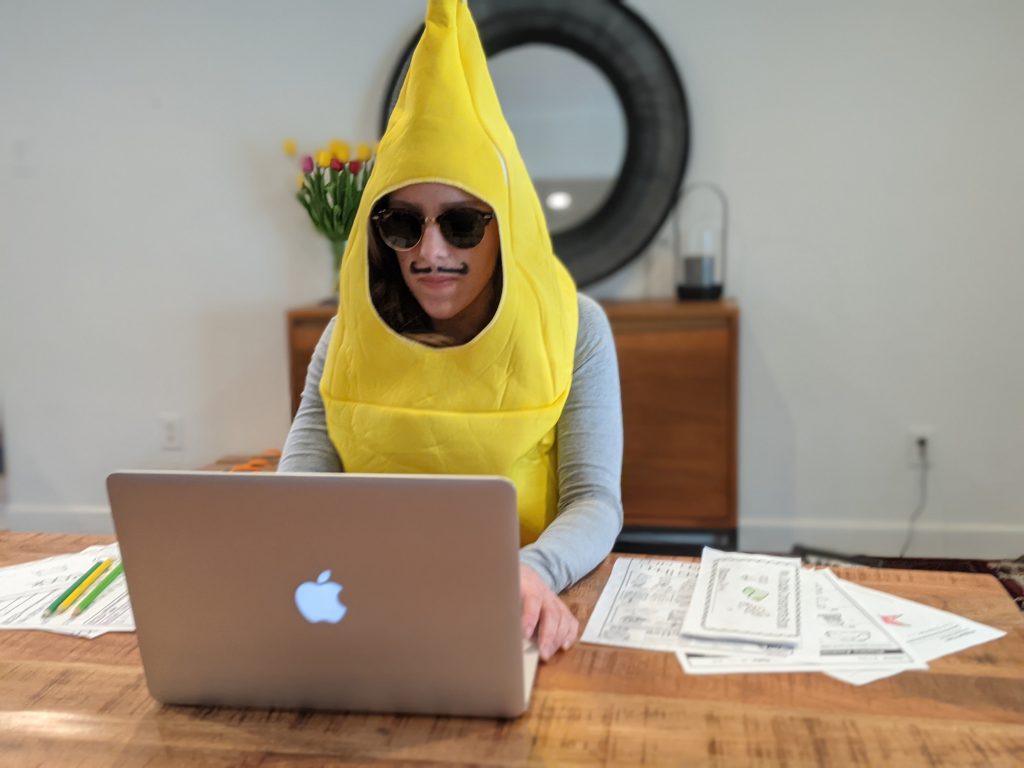
In this week’s video, Banana is struggling with distance learning. It’s too loud in his house and he can’t concentrate to do his schoolwork, so he calls his friend Horia from Welcome Club to ask her what to do. Horia tells Banana she was having a hard time, but then she asked Coach Makayla for help, and Makayla gave her headphones. Horia offers to ask on behalf of Banana, showing him what it means to be a helper.
4:00 p.m.
After the Coaches introduce themselves, students go into their breakout rooms where they play a game, talk about examples of when they gave and received help and complete the week’s craft together. During this time, Makayla moves in and out of breakout rooms.
4:30 p.m.
The students and coaches return to the main Zoom room. Makayla reminds them about tutoring on Tuesdays and Thursdays, and Becca shares the link to the latest Bad Banana video.
“Now, you have something fun to watch between now and the next Welcome Club,” she says.
The chat erupts with excited messages in response. Students sign off, though a few try to remain on for the coach’s debrief. Ehsan changes his name to “I’m a Coach!”
5:30 p.m.
After the staff debriefs, Makayla gathers up the remaining goodie bag items on the classroom floor. She makes a note of all the home visits she needs to schedule for the following week. She’s already thinking of ideas for next week’s club where they will introduce the new theme: perseverance.
Even after a full day, she is still energetic. The kids and their families make everything worth it. “Everyone who has ever succeeded at something had someone who believed in them,” she says. “I want to be one of those people who believe in them.”
There’s room for you to join staff and volunteers like Makayla as they make room for immigrants and refugees in the U.S. Give today to help programs like this flourish and enable our U.S. offices to start new ones!
To find out about local opportunities like volunteering, donating supplies, or becoming a WR Sacramento donor, find your nearest local U.S. office pages below!

Vanassa Hamra serves as the Communications Manager for World Relief Sacramento. Her professional background is in creative writing and marketing, and she has worked in both the for profit and nonprofit sectors. She is passionate about storytelling and lives by the mantra that when you hear someone’s story, they move from being a stranger to becoming your neighbor.
Get to Know Our Staff: Kenya
In 2021, we’re giving you the inside scoop on the work that World Relief is doing in communities around the world through a new series called, Get to Know Our Staff. Each month, you’ll hear from a different staff member from across the World Relief network. Through videos, stories and interviews you’ll learn more about who they are, the communities where they work, what they do and why they love what they do.
On deck this month is Noah Sankale Pesi, our Church Empowerment Zone Coordinator in Kajiado, Kenya. Noah has been working at World Relief Kenya since 2018 and is passionate about seeing churches mobilized to serve the most vulnerable. Hear more from Noah in the video below!
Do you want to create lasting change alongside passionate, mission-driven coworkers like Noah? World Relief is growing our team to meet the increased needs of our world, and we’re looking for people like you to join us.
Making Change for Girls in Malawi
Each year, 12 million girls across the globe are married before the age of 18. Every minute, 23 young girls are married off, putting their personal development and wellbeing at risk.
That’s 12 million girls — 12 million dreamers and artists, future doctors, teachers and community leaders — whose opportunity for childhood and education has been taken from them. At World Relief, we are striving to rewrite that narrative.
We believe all girls are made in the image of God, worthy of love and respect, and full of God-given potential for a bright future.
That’s why, with the crucial support of local churches and community members, World Relief has formed girls clubs in communities around the world. These weekly gatherings for girls between ages 10-18 seek to enhance girls’ self-esteem, encourage education and empower personal decision-making.
Today, in celebration of International Day of the Girl, two bright young women from our girls clubs in Malawi and their mentors share their stories and why they are grateful for the girls clubs in their community.
Girls Clubs
Bertha is 13 and the oldest daughter in a family of four children. She is a member of the Kalulu Adolescent Girls Club. Estina is 14 and the youngest of five. She’s a member of the Adolescent Kanjedza Girls Club.
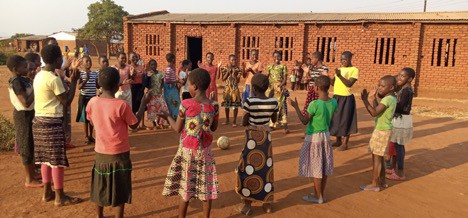
Both girls live with their families in the Chitowo community in Malawi. In their village, young girls often struggle to see the reality of a future beyond finding a suitor for marriage.
Yet, Bertha dreams of becoming a nurse someday, and Estina aspires to become a doctor.
Without a pathway where Bertha, Estina and thousands of girls like them can envision their future as nurses or doctors, early marriage is more difficult to prevent.
“Attending club meetings has been very helpful to me,” Bertha said. “There are many girls of my age who are out of school in my village. Some are even married. It is difficult to aspire for any other thing apart from getting married.”
Through the girls club, however, Bertha and her friends are given an avenue to learn, interact with one another, growing in love and respect in a safe environment.
For Estina, joining a girls club has helped her be more confident and less fearful. “During club meetings, we are encouraged to speak out our thoughts and this has helped us to develop confidence and a free spirit,” she said.
From One Generation to the Next
When a club gathers for their weekly meeting, girls play games, read stories, sing songs and learn to lead songs. With guidance from mentors — women from within the community — clubs foster an atmosphere where girls can excel as they feel more empowered, more knowledgeable and more confident.
Mentors like Eunice and Cecilia play a crucial role in helping girls combat long-held beliefs about themselves and understand their God-given potential and worth.
“As mentors, we are always available to attend to questions the girls may have,” Eunice said.
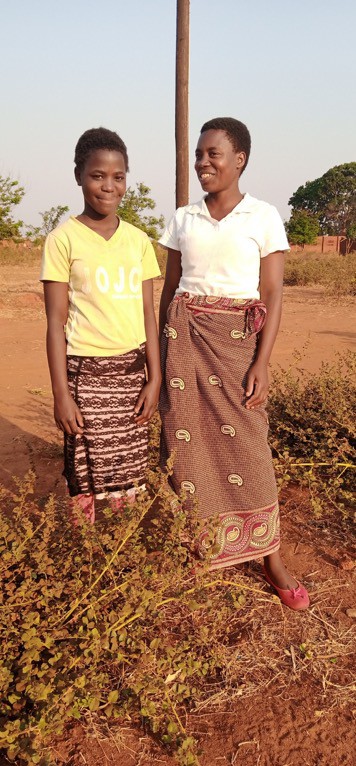
“We are proud of our work because we consider it a service to our community,” Cecilia added. “Although I do not have much education, when they came looking for mentors in our village, I offered myself. I realized that doing this is a way of developing my community. These girls have learnt the dangers of early marriages and teen pregnancies, we hope they will stay in school for long.”
Change that Lasts
World Relief Malawi has a total of 86 groups impacting adolescent girl children (ages 10-18). These groups serve to not only empower girls and prevent early marriages from happening now, but for generations to come.
The investment that mentors like Eunice and Cecilia are pouring into their communities remind us that we were all made for change. We were made for transformation, and we were made to transform our communities.
With education, access to opportunity and trusted community leaders helping rewrite the future of hundreds of girls, God’s love is being shown in tangible ways — creating a world of justice and flourishing for young girls and creating change that lasts.
Change isn’t easy. But when we move together we can be an irresistible force for good and an agent for lasting change.
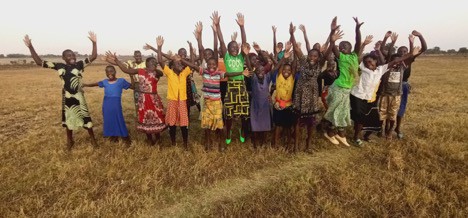
Dana North serves as the Marketing Manager at World Relief. With a background in graphic design and advertising and experiences in community development and transformation, Dana seeks to use the power of words and action to help create a better world. Dana is especially passionate about seeking justice for women and girls around the world.
Emmanuel Zyambo has been working with World Relief since 2017. He currently serves as the District Coordinator overseeing all of World Relief Malawi’s work in the Dedza District.
Rwanda Responds to COVID-19
It’s been a difficult season here in Rwanda. Like many places around the world, Rwanda experienced a total lockdown from mid-March to mid-May as cases of COVID-19 began sprouting up in communities across our country. Today, though some communities have begun to reopen, things have not completely returned to normal.
Most church buildings are still closed. Weddings can only have 30 people in attendance. Everyone must wear facemasks whenever we are out and about, and a country-wide curfew that begins at 7 p.m. and ends at 5 a.m. is still in place.
It’s been a difficult time, indeed, but the hardships and restrictions have caused us to think creatively and find new ways to serve the vulnerable and meet their evolving needs.
At World Relief Rwanda, we currently run programs in six different communities through what we call Church Empowerment Zones (CEZs). CEZs are networks of local churches that have come together to serve the most vulnerable. It is through these CEZs that we are able to offer programs in savings, gender equality and agriculture to name a few.
One such community is Nyamasheke District in Western Province Rwanda. Many of our staff who work in Nyamasheke live in a neighboring district that is currently still on total lockdown because of the high number of COVID-19 cases in that area. As a result, our staff are not able to leave their district to go to work in Nyamasheke.
In addition, many of the men and women in Nyamasheke rely on daily wages to meet their basic needs. But when the markets shut down, they had nowhere to sell their goods and missed out on that vital income. It’s been heartbreaking for myself and the rest of our team to see vulnerable people becoming more vulnerable.
But in the midst of this hardship, our team has been so encouraged to see local pastors from the Nyamasheke CEZ come together to continue serving the vulnerable in their communities. Although these pastors rely on the regular tithes and offerings that aren’t currently coming in due to churches being closed, they’ve banded together, mobilized their members and said, “We are going to do the best we can with the resources God has given us to really care for the vulnerable.”
Pastors like the ones from Nyamasheke have really stepped up by providing food to those who have not been able to make an income. Since March, churches from across the six CEZs served 4,056 families. In addition to these families, World Relief provided support to 1,346 families as well as support for 350 pastors and their families.
As we continue to adapt to this evolving situation in Rwanda, our team has drawn strength from scripture like this one found in 1 Corinthians 15:58 — “Therefore, my beloved brethren, be steadfast, immovable, always abounding in the work of the Lord, knowing that your labor is not in vain in the Lord.”
We’d ask that you continue to pray for us in Rwanda — for the health and safety of our staff as they carry out programs in compliance with social distancing measures; and for the pastors with whom we partner, that they would continue to discern and pursue God’s will in this difficult season.

Moses Ndahiro serves as the Country Director for World Relief Rwanda. He is passionate about addressing the roots of human problems and unlocking people’s potential to fulfill their God-given purposes.
3 Neglected Global Humanitarian Crises
World Humanitarian Day
Every year on August 19, we celebrate World Humanitarian Day — a day that commemorates humanitarian workers who, despite all odds, continue to provide life-saving support and protection to those most in need.
Around the world, people suffer daily from extreme poverty, violence, famine, displacement and much more. At World Relief, we seek to serve the most vulnerable in these situations, confronting these complex humanitarian crises with innovative and sustainable programs.
Providing life-saving assistance during an emergency is just one way we get to be the hands and feet of Jesus. Today, we want to share with you some of the lesser-known crises going on in the Democratic Republic of Congo, South Sudan and Sudan where our staff are faithfully working to assist those most in need.
Food Security in the Democratic Republic of Congo
The Global Food Security Index has been ranking countries’ levels of food security since 2012, measured by affordability, availability, quality and safety in access to food. The Democratic Republic of Congo (DRC) has consistently ranked in the bottom four, with one in six residents facing hunger every day. In 2019, the DRC ranked #4, only preceded by Yemen, Burundi and Venezuela.
In Yemen, civil war is causing people to go hungry, in Burundi conflict over land resources is one source fueling the country’s perpetual poverty, and in Venezuela, political upheaval has caused massive countrywide inflation affecting the food prices. Yet these countries have not continuously ranked so low on the index the way DRC has. So, why is rampant hunger such an issue in DRC?
Armed groups hiding in the dense tropical forests provide one answer. They wreak havoc on local civilians. Congolese farmers are prevented from accessing their fields; whole villages are raided and sometimes burnt to the ground; gender-based violence has become the social norm, and mass internal displacement has disrupted food supply chains. What’s more, unceasing waves of Ebola outbreaks coupled with measles and now a COVID-19 pandemic has only added to the food security crisis.
Education in South Sudan
For Africa’s youngest nation, civil conflict broke out shortly after South Sudan gained independence in 2011, pitting ethnic groups and political parties against one another. As is often the case, children silently suffer the brunt of conflict. Yet sadly, education is often the most neglected sector in government and humanitarian response in South Sudan.
Prior to COVID-19, UNICEF estimated that 72% of South Sudan’s primary-aged children did not attend school, representing the world’s highest proportion of out-of-school children of any country. UNESCO put this number at 2.2 million children, with at least one in three school buildings non-operational due to war destruction, closure or being occupied by internally displaced persons or military groups.
When COVID-19 hit, the South Sudanese government closed down schools, much like other governments around the world. However, the lack of access to education has far more drastic and lasting effects in South Sudan.
The risk of physical and sexual violence increases as does child labor, sex trafficking, childhood marriage and army conscription. Food scarcity also increases as children lose access to school-provided meals, perpetuating the cycles of poverty and conflict and preventing this vulnerable new country from flourishing.
Political Unrest and Economic Insecurity in Sudan
In April 2019, Sudanese protestors peacefully took to the streets and removed former President Omar al-Bashir. Following the coup, a military-led council took power, prompting another series of protests which continue today. These protests aim to decrease inflation, implement greater civilian rule and reform laws that currently restrict freedoms.
Thus far, much progress has been made: alcohol consumption is allowed for non-Muslims, women can travel with their children without first obtaining the consent of a male guardian, female genital mutilation has been banned, and the crime of apostasy (a person’s conversion from Islam to another religion) has been abolished. Though these reforms signify positive change toward a more inclusive, democratic society, there is still much work to do.
Security forces have responded violently to some protesters, often resulting in death. Additionally, the economic problems at the root of the protests have made life difficult for the average citizen. Increased inflation rates often make it impossible to afford fuel and food, and widespread food insecurity has only been made worse by the presence of COVID-19.
US sanctions and a host of other factors have only exacerbated these economic issues. Sudan is on the U.S. Government’s list of State Sponsored Terrorism, a list that makes it difficult for Sudan to receive aid from international financial institutions, among other limitations. UN Attorney General Antonio Gutierrez has vigorously appealed for Sudan to be removed from this list so that the country can be reintegrated into the global economy, but to no avail thus far.
How We’re Responding
Though these situations can seem intractable, we believe the love of God and the work of His people can bring about lasting change in each of these countries. At World Relief we’re adapting to these constantly changing circumstances and finding innovative ways to serve our beneficiaries through humanitarian assistance and life-saving interventions.
In DRC, 3,500 farmers receive direct assistance in improved agricultural techniques, helping alleviate hunger for 164,000 individuals across three highly food insecure provinces.
In South Sudan, 50,000 students are educated through World Relief supported schools. Recently, one primary school in the Bentiu camp for Internally Displaced Persons ranked #1 in the country for primary student exam score results. During COVID-19, we continue to employ innovative approaches by encouraging student access to national radio learning programs.
And in Sudan, we’re providing malnutrition treatment to over 34,000 children under the age of 5 and pregnant women. We’re also giving agricultural support and food distribution for over 62,000 direct beneficiaries, and we’re further addressing economic crisis and resulting food insecurity by integrating livelihoods training throughout our programming.
Please join us in prayer for our brothers and sisters all over the world who suffer from various humanitarian crises. May we all see the hand of God at work even, in our darkest moments.

Lydia Dawson serves as World Relief’s Humanitarian and Disaster Response Unit Program Officer in Sudan, and in disaster response worldwide. Prior to joining World Relief, Lydia worked in homeless services and community development in Oregon and California. She is passionate about equity and honor for underrepresented groups, both locally and internationally.

Amanda Patterson serves as World Relief’s Humanitarian and Disaster Response Unit Program Officer in DR Congo and South Sudan. Prior to joining World Relief, Amanda worked overseas as a humanitarian responder to refugee and conflict emergencies in Niger, South Sudan, Greece, and Ethiopia with a large Christian NGO. She is passionate about helping others experience the beauty and diversity of God’s creation through art, nature and cultural engagement.
COVID and the Issues: Gender-Based Violence
An estimated 243 million women and girls around the world have been subjected to sexual and/or physical violence by an intimate partner in the last 12 months. Experts warn that this number is likely to increase dramatically as security, health and money worries heighten stress within homes, and confined living conditions place women at heightened risk.
Today, in the last of our six-week series, COVID and the Issues, we’re talking with Joanna Kretzer Chun, World Relief’s Director of our Program Resource Team who reveals why many are calling the rise in COVID related gender-based violence the “shadow pandemic.”
In the discussion that follows, Joanna explains how World Relief takes a comprehensive approach to preventing gender-based violence. She explains some of the factors that are creating this “shadow pandemic,” and reveals why women at risk of gender-based violence are less likely to get the help they need right now. While there are no simple solutions, it was encouraging to hear Joanna’s thoughts on what we’re learning as an organization and how these learnings can help women both now and in the future.
To learn more about how COVID-19 is affecting other program areas, view the rest of the COVID and the Issues series here.
Are We Becoming a Nation of Closed Doors?
Last month, World Relief published a report in collaboration with Open Doors USA. This report explores how persecuted Christians and the U.S. refugee resettlement and asylum process have been impacted by recent changes in immigration policy.
The report found that since 2015, the number of persecuted Christians resettled in the U.S. has dropped by nearly 90%.
While the report focuses primarily on the effects policy changes in the U.S. have had on persecuted Christians, various other persecuted minority groups have also been largely shut out of resettlement in recent years.
As Christians, we believe that all people have the right to religious freedom and that religious minority of any sort — not just those who share our Christian faith — should be protected.
In an article recently published by The Christian Post, Matt Soerens, World Relief’s U.S. Director of Church Mobilization said, “Since the time of the pilgrims, America has been proud of its legacy of opening its doors to those experiencing religious persecution… American Christians must ask ourselves some tough questions. Scripture makes it clear that all believers are part of the body of Christ and that when one member suffers, the entire body suffers alongside it.”
These dramatic changes to U.S. refugee policy, which many American Christians seem to be either unaware of or indifferent to, “suggest that we’ve closed our ears — and our nation’s doors — to this suffering,” Matt writes.
Download the report to learn more.
COVID and the Issues: Food Security & Nutrition
Last month, Oxfam projected that the number of people experiencing crisis-level hunger could reach 270 million in 2020 as a result of the coronavirus pandemic – an increase of over 80%.
The number is shocking.
Today, in the fifth of our six-week series, COVID and the Issues, we’re talking with Prava Chhetri and Rafael Flores, World Relief’s Technical Advisors for Food Security & Nutrition.
They will share about this concerning projection, as well as how COVID is impacting our nutrition work on the ground.
In the discussion that follows, Prava & Rafael give a brief overview of our food security and nutrition programs and discuss how COVID-19 is impacting global food production and access, as well as the nutritional consequences of this change.
They also open up about how World Relief’s programs are adapting in the face of this crisis, ensuring we do all we can to prevent the next major global famine.

Francesca Albano currently serves as Director of Branded Content at World Relief. With a background in Cultural Anthropology and a graduate degree in Strategic Marketing Communications, she connects her interests in societal studies and global cultures with her training in brand strategy and storytelling. Francesca is especially passionate about grassroots community development and the treatment and advancement of women and girls around the world.
COVID and the Issues: U.S. Programs
World Relief currently operates local offices in 18 cities across the United States. Our teams are committed to helping new immigrants thrive by providing vital services and building communities of love and welcome. In addition to case management, our U.S. offices offer English language classes, job training and placement programs, legal services, youth mentoring, mental health services and more.
Prior to the COVID-19 pandemic, all U.S. programming took place in person. But in March, everything changed. As the country shut down, so did our physical office locations, and our teams were forced to find a way to bring their very interactive programming to a virtual space.
Today, in the fourth week of our COVID and the Issues series, we’re talking with Jennifer Foy, Vice President of U.S. Programs at World Relief. Jenn discusses the new needs that immigrants are facing in the wake of the pandemic and how our U.S. teams are adapting to meet those needs. In Chicagoland alone, the staff received 500 phone calls in less than a week from immigrants who had been laid off and needed help navigating unemployment and finding new jobs.
It’s been overwhelming and unprecedented. But, as Jenn discusses, the resilience and creativity that is being birthed out of hardship gives us something to hope for.
Come back next week to learn more about how COVID-19 is affecting food security and nutrition across the globe. To join us in addressing these issues visit worldrelief.org/covid-19.

Rachel Clair serves as a Content Writer at World Relief. With a background in creative writing and children’s ministry, she is passionate about helping people of all ages think creatively and love God with their hearts, souls and minds.
COVID and the Issues: Health
Women, men, children and entire communities across the globe have been dramatically impacted by COVID-19. In order to stop the spread of the virus, businesses, land and air transport, as well as essential services, have been forced to lock down.
Without the ability to continue treatment and a six-month disruption in access to antiretrovirals, AIDS-related deaths could double in sub-Saharan Africa in 2020 alone.
80 million children are at risk for contracting preventable diseases because immunization services at many health centers have slowed or stopped.
Essential maternal and child health interventions are being reduced and could result in maternal mortality rising from 8% to 38% and children under 5 mortality from 9.8% to 44.7%.
With no access to these life-saving health services, COVID-19 could undo years of progress. Today, in the third of our six-week series, COVID and the Issues, we’re talking with Allison Flynn, World Relief’s Senior Health & Nutrition Program Advisor. Allison gives an overview of our health and nutrition programs and sheds light on the vital importance of creating and providing access to health care and information to individuals and communities, especially in the midst of a pandemic when the normal channels of access are closed.
Come back next week to learn more about how COVID-19 is affecting our US programs. And to join us as we fight back against the residual effects of COVID-19, visit worldrelief.org/covid-19.

Dana North serves as the Marketing Manager at World Relief. With a background in graphic design and advertising and experiences in community development and transformation, Dana seeks to use the power of words and action to help create a better world. Dana is especially passionate about seeking justice for women and girls around the world.











